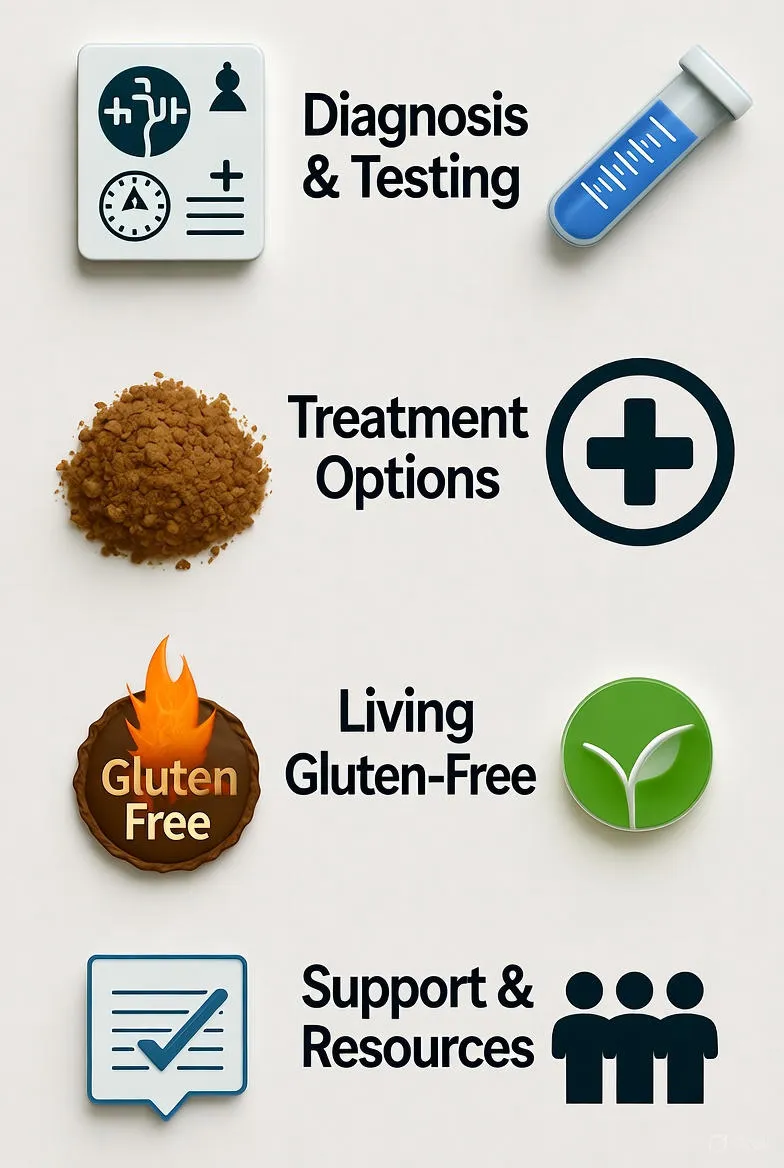Unveiling the Link: How Gluten Impacts Thyroid Health and What You Can Do About It
Explore the profound effects of gluten on thyroid health, from molecular mimicry to leaky gut. Learn evidence-based benefits of a gluten-free diet for Hashimoto's and Graves', plus practical implementation tips for optimal wellness.

Understanding the Thyroid Gland and Its Vital Role
The thyroid gland, a small butterfly-shaped organ nestled in the front of your neck, plays a monumental role in regulating your body's metabolism. It produces hormones like thyroxine (T4) and triiodothyronine (T3), which influence everything from heart rate and body temperature to energy levels and digestion. When the thyroid functions optimally, you feel energized and balanced. However, disruptions in thyroid health can lead to a cascade of issues, including fatigue, weight fluctuations, mood swings, and even more severe conditions like hypothyroidism or hyperthyroidism.
Autoimmune thyroid diseases, such as Hashimoto's thyroiditis and Graves' disease, are among the most common thyroid disorders. In Hashimoto's, the immune system mistakenly attacks the thyroid, leading to underproduction of hormones and hypothyroidism. Graves' disease, on the other hand, causes overproduction, resulting in hyperthyroidism. These conditions affect millions worldwide, with women being disproportionately impacted. While genetics and environmental factors contribute, emerging research points to dietary influences, particularly the role of gluten, as a potential trigger or exacerbator.
What Exactly is Gluten?
Gluten is a composite of proteins found in wheat, barley, rye, and sometimes oats due to cross-contamination. It's the sticky substance that gives dough its elasticity, making bread chewy and pasta resilient. For most people, gluten is harmless and even enjoyable. However, for those with celiac disease—an autoimmune disorder triggered by gluten—or non-celiac gluten sensitivity, it can wreak havoc on the digestive system and beyond.
In the context of thyroid health, gluten's impact extends far past the gut. Its protein structure, particularly gliadin, bears a striking resemblance to components of thyroid tissue. This similarity sets the stage for immune confusion, where the body's defense mechanisms might misfire, targeting the thyroid instead of—or in addition to—the intruder.
The Intricate Connection: How Gluten Affects the Thyroid
The link between gluten and thyroid dysfunction isn't mere coincidence; it's rooted in several biological mechanisms. At the forefront is molecular mimicry, a process where the immune system confuses gluten proteins with thyroid proteins. When you consume gluten, digestive enzymes partially break it down into peptides. In susceptible individuals, these peptides cross into the bloodstream, prompting the production of antibodies against gliadin. Due to structural parallels with thyroid enzymes like transglutaminase, these antibodies can cross-react, attacking the thyroid gland and elevating levels of thyroid peroxidase antibodies (anti-TPO) and thyroglobulin antibodies.
Another critical pathway is leaky gut syndrome, or increased intestinal permeability. Gluten stimulates the release of zonulin, a protein that loosens the tight junctions between intestinal cells. This allows undigested food particles, toxins, and bacteria to leak into the bloodstream, triggering widespread inflammation. Chronic inflammation is a hallmark of autoimmune diseases, and for the thyroid, it amplifies the immune assault, potentially worsening antibody production and glandular damage.
Furthermore, gluten can disrupt the gut microbiome, the trillions of bacteria that support immune regulation. An imbalanced microbiome fosters dysbiosis, which has been linked to heightened autoimmune activity. Studies suggest that individuals with autoimmune thyroiditis often exhibit gut dysbiosis, and gluten's role in perpetuating this imbalance could indirectly impair thyroid function.
Scientific Evidence Supporting the Gluten-Thyroid Link
Research into gluten's effects on the thyroid has gained momentum over the past two decades, revealing compelling, though not always conclusive, evidence. A study published in 2001 found that adults with celiac disease had a fourfold increased risk of autoimmune thyroid disease compared to the general population. Similarly, a 1998 European study highlighted the co-occurrence of celiac disease and thyroid autoimmunity, underscoring the need for screening in thyroid patients.
More recent investigations have explored gluten-free diets' therapeutic potential. In a 2018 trial involving women with Hashimoto's thyroiditis, participants who adhered to a strict gluten-free diet for six months experienced significant reductions in thyroid antibody levels. Another study from 2001 in the American Journal of Gastroenterology reported improvements in thyroid function tests among celiac patients after gluten withdrawal. These findings suggest that eliminating gluten can not only halt progression but also promote healing in some cases.
However, the evidence isn't unanimous. A review of multiple studies indicates that while gluten avoidance benefits those with confirmed celiac disease or gluten sensitivity, the advantages for all thyroid patients remain unclear. Larger, randomized controlled trials are needed to solidify these observations, but anecdotal reports from clinicians and patients alike paint a picture of symptom relief, including reduced fatigue, better weight management, and stabilized hormone levels.
Spotlight on Hashimoto's and Graves' Disease
For Hashimoto's patients, gluten's inflammatory effects can exacerbate the already inflamed thyroid, leading to fluctuating TSH levels and persistent hypothyroid symptoms despite medication. In Graves' disease, the hyperthyroid state may be influenced similarly, with gluten potentially aggravating eye issues and heart palpitations through sustained immune activation.
Prevalence data is telling: up to 9% of individuals with autoimmune thyroid disease also have celiac disease, far exceeding the 1% in the general population. This overlap suggests a shared genetic predisposition, possibly involving HLA-DQ2 and HLA-DQ8 genes, which heighten sensitivity to both gluten and thyroid antigens.
Who Should Consider Cutting Out Gluten?
Not everyone with thyroid issues needs to swear off gluten entirely. The decision hinges on individual factors. If you have diagnosed celiac disease, a lifelong gluten-free diet is non-negotiable to prevent intestinal damage and associated complications, including thyroid autoimmunity.
For those with non-celiac gluten sensitivity—characterized by bloating, brain fog, or joint pain after gluten exposure—a trial elimination could yield benefits. Symptoms like unexplained fatigue, hair loss, or irregular menstrual cycles in thyroid patients might improve sans gluten. Additionally, anyone with elevated thyroid antibodies or a family history of autoimmunity stands to gain from exploring this dietary shift.
Consulting a healthcare provider is crucial. Blood tests for celiac disease (e.g., anti-tissue transglutaminase antibodies) and comprehensive thyroid panels (TSH, free T3/T4, antibodies) provide a roadmap. Stool tests for zonulin or comprehensive microbiome analysis can further illuminate gut-thyroid interplay.
Unlocking Benefits: What a Gluten-Free Diet Offers for Thyroid Health
Adopting a gluten-free lifestyle can be transformative for thyroid health. Primary benefits include:
- Reduced Inflammation: By sealing the gut and curbing zonulin release, gluten elimination dials down systemic inflammation, easing the immune burden on the thyroid.
- Lower Antibody Levels: Clinical trials show declines in anti-TPO and thyroglobulin antibodies, potentially slowing autoimmune progression.
- Symptom Alleviation: Many report boosted energy, improved digestion, clearer skin, and enhanced mood—hallmarks of balanced thyroid function.
- Weight Stabilization: Gluten's removal often aids metabolic regulation, countering the weight gain common in hypothyroidism.
- Enhanced Nutrient Absorption: A healthier gut improves uptake of selenium, zinc, and iodine—nutrients vital for thyroid hormone synthesis.
Beyond the thyroid, gluten-free eating supports overall well-being, reducing risks of related conditions like osteoporosis or cardiovascular disease.
Practical Guide: How to Embrace a Gluten-Free Diet
Transitioning to gluten-free doesn't mean sacrificing flavor or variety. Start with these steps:
- Read Labels Diligently: Scan for hidden gluten in sauces, soups, and medications. Opt for certified gluten-free products to avoid cross-contamination.
- Stock Up on Alternatives: Swap wheat flour for almond, coconut, or oat flour (certified gluten-free). Enjoy quinoa, rice, buckwheat, and millet as grain substitutes.
- Meal Prep Smartly: Batch-cook gluten-free staples like vegetable stir-fries, grilled proteins, and salads. Experiment with recipes like zucchini noodles or cauliflower rice.
- Boost Thyroid-Supportive Foods: Incorporate selenium-rich Brazil nuts (just one or two daily), antioxidant-packed berries, omega-3 sources like salmon, and probiotic ferments such as sauerkraut.
- Supplements if Needed: Consider digestive enzymes, L-glutamine for gut repair, or probiotics under professional guidance.
Working with a registered dietitian ensures nutritional completeness, preventing deficiencies in fiber, B vitamins, or iron.
Navigating Challenges on a Gluten-Free Journey
Going gluten-free isn't without hurdles. Social dining can feel isolating—politely communicate needs at gatherings. Grocery costs may rise initially, but bulk buying and home cooking mitigate this. Texture cravings for bread or pasta? Gluten-free baking mixes and innovative veggies fill the gap.
Emotional aspects matter too; food is cultural and comforting. View this as empowerment, not restriction. Track progress with a journal: note energy shifts, lab results, and mood. Patience is key—benefits may unfold over weeks to months.
If symptoms persist, explore adjuncts like stress management (yoga, meditation) or addressing co-factors such as infections or hormone imbalances.
Final Thoughts: Empowering Your Thyroid Health
The interplay between gluten and thyroid health illuminates how diet shapes our inner ecosystem. While not a panacea, reducing or eliminating gluten offers a low-risk, high-reward strategy for many with thyroid concerns. By fostering gut integrity, quelling inflammation, and sidestepping molecular pitfalls, you reclaim control over your vitality.
Remember, personalized medicine trumps one-size-fits-all. Partner with your doctor, listen to your body, and celebrate small victories. A nourished gut and a resilient thyroid pave the way to thriving, not just surviving. Here's to your empowered health journey.


